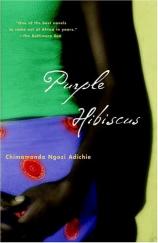Reading Group Guide
Discussion Questions
Purple Hibiscus: A Novel

1. What is the emotional atmosphere in Kambili's home? What effect does this have on Kambili and Jaja? Why is their father so strict?
2. When Kambili visits Aunty Ifeoma, she is immediately struck by how much laughter fills the house. Why is it so surprising to her to hear people speak, laugh, and argue so freely? How does she manage to regain her own ability to speak, and, most importantly, to laugh?
3. When Kambili hears Amaka weeping after her grandfather's death, Kambili thinks: "She had not learned the art of silent crying. She had not needed to" [p. 185]. What does this passage suggest about the differences between Amaka and Kambili? In what other ways are Aunty Ifeoma's children—Amaka, Obiora, and Chima—different from Kambili and Jaja?
4. Amaka says, "Uncle Eugene is not a bad man, really. . . . People have problems, people make mistakes" [p. 251]. Is he in fact a "bad man"? Why does he violently abuse his wife and children? What good deeds does he perform? How can his generosity and political integrity coexist with his religious intolerance?
5. In what ways are Aunty Ifeoma and Eugene different from one another? How does each character approach life? How do they differ in their religious views? Why is Ifeoma so much happier even though she is poor and her brother is rich?
6. Eugene boasts that his Kambili and Jaja are "not like those loud children people are raising these days, with no home training and no fear of God"; to which Ade Coker replies: "Imagine what the Standard would be if we were all quiet" [p. 58]. Why is quiet obedience a questionable virtue in a country where the truth needs to be spoken? In what ways is the refusal to be quiet dangerous?
7. What kind of man is Papa-Nnukwu? What are his most appealing qualities? What do the things he prays for say about his character? Why has his son disowned him so completely?
8. What are the ironies involved in Eugene loving God the Father and Jesus the Son, but despising his own father and abusing his own son?
9. Why does Kambili's mother keep returning to her husband, even after he beats her so badly that he causes a miscarriage, and even after he nearly kills Kambili? How does she justify her husband's behavior? How should she be judged for poisoning her husband?
10. How does Father Amadi bring Kambili to life? Why is her relationship with him so important to her sense of herself?
11. Jaja questions why Jesus had to be sacrificed, "Why did He have to murder his own son so we would be saved? Why didn't He just go ahead and save us?" [p. 289] And yet, Jaja sacrifices himself to save his mother from prison. Why does he do this? Should this be understood as a Christian sacrifice or a simple act of compassion and bravery?
12. After Aunty Ifeoma moves her family to the United States, Amaka writes, "there has never been a power outage and hot water runs from a tap, but we don't laugh anymore . . . because we no longer have the time to laugh, because we don't even see one another" [p. 301]. What does this passage suggest about the essential difference between American culture and African culture?
13. What does the novel as a whole say about the nature of religion? About the relationship between belief and behavior?
14. What does Purple Hibiscus reveal about life in Nigeria? How are Nigerians similar to Americans? In what significant ways are they different? How do Americans regard Nigerians in the novel?
15. Why does Chimamanda Ngozi Adichie end the novel with an image of rain clouds? What are the implications of Kambili feeling that the clouds hung so low she "could reach out and squeeze the moisture from them"? What is the meaning of the novel's very simple final sentence: "The new rains will come down soon"?
Purple Hibiscus: A Novel
- Publication Date: September 14, 2004
- Paperback: 307 pages
- Publisher: Anchor
- ISBN-10: 1400076943
- ISBN-13: 9781400076949







